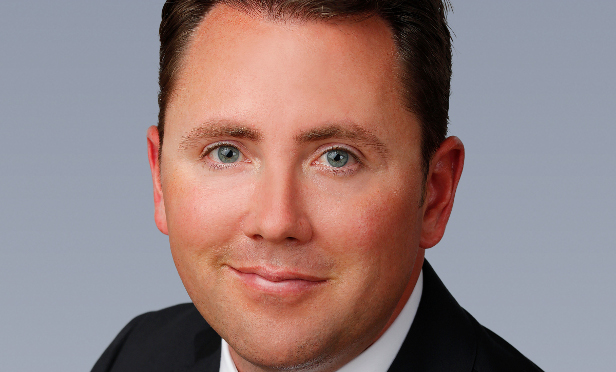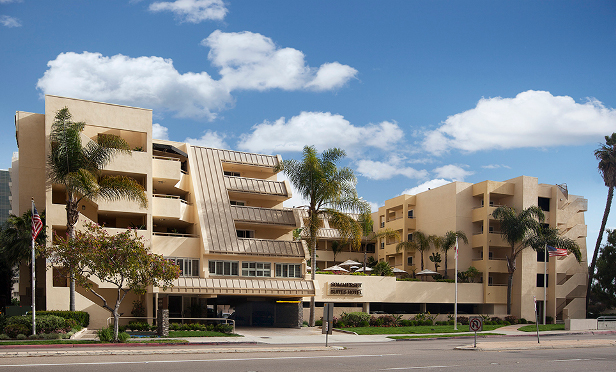
SAN DIEGO—Buying a hotel that used to be an apartment complex in order to convert it back to apartments has its complexities. Holliday Fenoglio Fowler L.P.'s investment sales team, led by director Hunter Combs and managing director Scott Hall, alongside the firm's debt-placement team led by senior managing director Aldon Cole, recently represented buyer SENTRE in the acquisition, financing and repositioning of the Sommerset Suites Hotel into an 80-unit boutique apartment community named the Whitson in the Hillcrest neighborhood of San Diego.
SENTRE purchased the hotel free and clear of existing debt. Working on behalf of the new owner, HFF placed the five-year, fixed-rate loan with a life insurance company. Loan proceeds will be used to purchase the hotel and fund the repositioning.
The property was originally designed in the late 1980s as a boutique apartment community. The sellers converted the property into a hotel in the mid-90s, leaving most of the apartment amenities intact, including a heated pool and spa, barbeque area, dining room and business center with units containing full kitchens, private balconies and efficient floor plans.
The Whitson will feature studio and one-bedroom units with 96 parking spaces, 80 of which are covered. Located at 606 Washington St., the property is in the heart of Hillcrest, one of San Diego's live/work/play areas. The Whitson is within walking distance to restaurants, shopping, art galleries, nightlife and Balboa Park. Additionally, the property is up the hill from downtown San Diego and near a healthcare employment cluster anchored by Scripps Mercy Hospital and UC San Diego Medical Center.
We spoke with Combs about the transaction, its complexities and the challenges involved with transacting properties that have been through multiple conversions.
GlobeSt.com: What were some of the complexities of this transaction, and how were they met?
Combs: This was an off-market transaction, and it was a seller who wasn't market motivated. They had plans to do renovations themselves and were approached to potentially sell it. The first big hurdle was getting to a purchase price that was to their expectations, and the second biggest hurdle was the conversion process from a hotel to an apartment complex through the City. Lastly there was an issue with the number of parking spaces. In this type of setting, you can't go create additional parking spots; it was impossible to do. Some of the parking spots being used at the hotel were leased from the adjacent hospital. The City wanted that in perpetuity, and the buyer couldn't perform on that; it was just a lot of managing expectations. The transaction took a good eight months, with many of the deadlines coming down to the last hour, but in the end, everyone was working toward a common goal.

GlobeSt.com: What are the challenges involved in selling a property that has been through a number of conversions as this one has?
Combs: If this were going to be a marketed transaction, I would say it would be worth it for the seller to do some due diligence to check the feasibility of conversion, but this was up to the buyer and their land use attorney to run through that process, and they had strict due-diligence timelines to get that done.
This deal was unique in that it's studios and one-bedrooms of about 519 square feet, plus kitchenettes. This was a prime candidate for conversion to apartments, being one of the top two largest buildings in Hillcrest. A big part of this deal was the location and construction of it. Once renovated, it would feel like and look like a top-tier apartment project.
The hotel was very well maintained; it was a podium project like a modern apartment building, and at the end of the day, it will look and feel like a new building.
GlobeSt.com: How unusual is it to see a property change from apartments to a hotel and back to apartments again?
Combs: I've never seen it in our market—maybe other major metropolitan areas have.
GlobeSt.com: At this point in the cycle, do you anticipate seeing more transactions with properties that have undergone conversions?
Combs: I would expect so. I think there are a lot of hotels like this that are limited-service hotels that have more apartment-style units in A-plus locations. Apartment valuations currently trump their hotel counterparts, so it makes sense to investigate that alternative. The apartment valuation exceeded the hotel valuation by more than $1 million in our case. So, if you're a hotel owner thinking only about a hotel sale, you might consider the conversion scenario.

SAN DIEGO—Buying a hotel that used to be an apartment complex in order to convert it back to apartments has its complexities. Holliday Fenoglio Fowler L.P.'s investment sales team, led by director Hunter Combs and managing director Scott Hall, alongside the firm's debt-placement team led by senior managing director Aldon Cole, recently represented buyer SENTRE in the acquisition, financing and repositioning of the Sommerset Suites Hotel into an 80-unit boutique apartment community named the Whitson in the Hillcrest neighborhood of San Diego.
SENTRE purchased the hotel free and clear of existing debt. Working on behalf of the new owner, HFF placed the five-year, fixed-rate loan with a life insurance company. Loan proceeds will be used to purchase the hotel and fund the repositioning.
The property was originally designed in the late 1980s as a boutique apartment community. The sellers converted the property into a hotel in the mid-90s, leaving most of the apartment amenities intact, including a heated pool and spa, barbeque area, dining room and business center with units containing full kitchens, private balconies and efficient floor plans.
The Whitson will feature studio and one-bedroom units with 96 parking spaces, 80 of which are covered. Located at 606 Washington St., the property is in the heart of Hillcrest, one of San Diego's live/work/play areas. The Whitson is within walking distance to restaurants, shopping, art galleries, nightlife and Balboa Park. Additionally, the property is up the hill from downtown San Diego and near a healthcare employment cluster anchored by Scripps Mercy Hospital and UC San Diego Medical Center.
We spoke with Combs about the transaction, its complexities and the challenges involved with transacting properties that have been through multiple conversions.
GlobeSt.com: What were some of the complexities of this transaction, and how were they met?
Combs: This was an off-market transaction, and it was a seller who wasn't market motivated. They had plans to do renovations themselves and were approached to potentially sell it. The first big hurdle was getting to a purchase price that was to their expectations, and the second biggest hurdle was the conversion process from a hotel to an apartment complex through the City. Lastly there was an issue with the number of parking spaces. In this type of setting, you can't go create additional parking spots; it was impossible to do. Some of the parking spots being used at the hotel were leased from the adjacent hospital. The City wanted that in perpetuity, and the buyer couldn't perform on that; it was just a lot of managing expectations. The transaction took a good eight months, with many of the deadlines coming down to the last hour, but in the end, everyone was working toward a common goal.

GlobeSt.com: What are the challenges involved in selling a property that has been through a number of conversions as this one has?
Combs: If this were going to be a marketed transaction, I would say it would be worth it for the seller to do some due diligence to check the feasibility of conversion, but this was up to the buyer and their land use attorney to run through that process, and they had strict due-diligence timelines to get that done.
This deal was unique in that it's studios and one-bedrooms of about 519 square feet, plus kitchenettes. This was a prime candidate for conversion to apartments, being one of the top two largest buildings in Hillcrest. A big part of this deal was the location and construction of it. Once renovated, it would feel like and look like a top-tier apartment project.
The hotel was very well maintained; it was a podium project like a modern apartment building, and at the end of the day, it will look and feel like a new building.
GlobeSt.com: How unusual is it to see a property change from apartments to a hotel and back to apartments again?
Combs: I've never seen it in our market—maybe other major metropolitan areas have.
GlobeSt.com: At this point in the cycle, do you anticipate seeing more transactions with properties that have undergone conversions?
Combs: I would expect so. I think there are a lot of hotels like this that are limited-service hotels that have more apartment-style units in A-plus locations. Apartment valuations currently trump their hotel counterparts, so it makes sense to investigate that alternative. The apartment valuation exceeded the hotel valuation by more than $1 million in our case. So, if you're a hotel owner thinking only about a hotel sale, you might consider the conversion scenario.
Want to continue reading?
Become a Free ALM Digital Reader.
Once you are an ALM Digital Member, you’ll receive:
- Breaking commercial real estate news and analysis, on-site and via our newsletters and custom alerts
- Educational webcasts, white papers, and ebooks from industry thought leaders
- Critical coverage of the property casualty insurance and financial advisory markets on our other ALM sites, PropertyCasualty360 and ThinkAdvisor
Already have an account? Sign In Now
*May exclude premium content© 2025 ALM Global, LLC, All Rights Reserved. Request academic re-use from www.copyright.com. All other uses, submit a request to [email protected]. For more information visit Asset & Logo Licensing.








